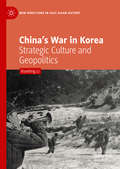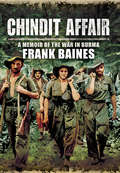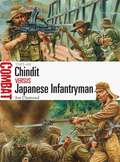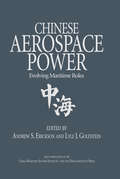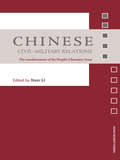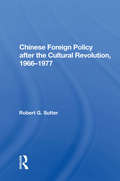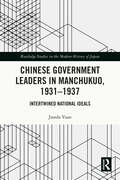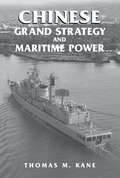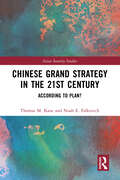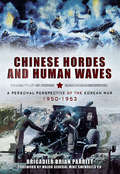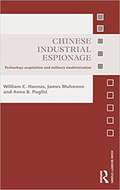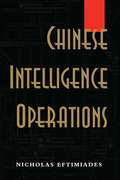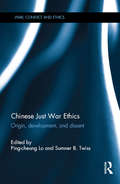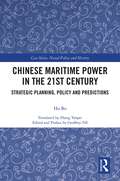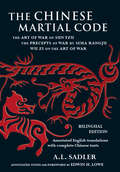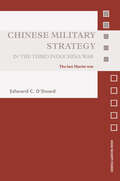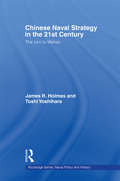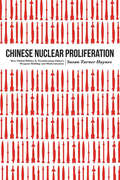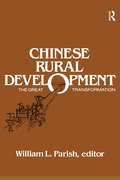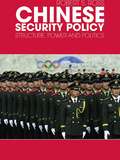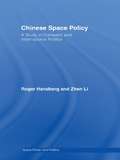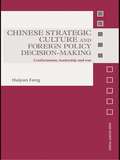- Table View
- List View
China’s Grand Strategy: Trends, Trajectories, and Long-Term Competition
by Chad J. Ohlandt Andrew Scobell Eric Warner Edmund J. Burke Cortez A. Cooper III Sale Lilly J.D. WilliamsTo explore what extended competition between the United States and China might entail out to 2050, the authors of this report identified and characterized China’s grand strategy, analyzed its component national strategies (diplomacy, economics, science and technology, and military affairs), and assessed how successful China might be at implementing these over the next three decades.
China’s War in Korea: Strategic Culture and Geopolitics (New Directions in East Asian History)
by Xiaobing LiThis book re-visits the history of the Korean War of 1950-1953 from a Chinese perspective, examining Chinese strategy and exploring why China sent three million troops to Korea, in Mao’s words, to “defend the homeland and safeguard the country”—giving rise to what became the war’s common name in China. It also looks into the relatively neglected historical factors which have redefined China’s security concerns and strategic culture. Using newly available sources from China and the former Soviet Union, the book considers how interactive the parameters of defense changes were in a foreign war against Western powers, how flexible Chinese strategy was in the context of its intervention, and how expansive its strategic cultural repertoire was at the crucial moment to “defend the country.” Providing a re-examination of China’s military decisions and strategy evolution, this text narrates the story of successive generations of Chinese leaders and provides a key insight into security issues in China and Northeast Asia today.
Chindit Affair: A Memoir of the War in Burma
by Frank BainesIn March 1944, some 2,200 battle trained men of 111 Brigade flew from India into northern Burma to land on improvised airstrips cleared from the jungle, They were part of General Orde Wingates Chindit force sent to fight the Japanese deep behind their lines. Five months later, 111 Brigade was down to 118 fit men eight British officers, a score of British soldiers and 90 Gurkhas. One of those eight officers was Frank Baines, and in Chindit Affair he tells, in vivid language and with shrewd insight, what happened.Frank commanded two platoons of young Gurkhas and was attached to 111 Brigade Headquarters, serving under John Masters, where he had a close-up view for most of the time. His account throws new light on the leadership of the Chindit campaign, but above all it is a soldiers story.All the horrors of jungle warfare are here bodies blood-sucked by leeches and corpses impaled by bamboo; Japanese soldiers reduced to eating human flesh; a court martial and execution; soldiers falling sick and dropping by the wayside, and being killed and wounded in action. He also captures the atmosphere of the jungle; its watercourses, trees, birds and the Kachin villagers simple way of life. No other account of the Chindit operations touches the same raw nerves, and none recreates so immediately the sensations of being there in the jungle and hills which devoured nearly all of them.ABOUT THE AUTHORBorn in 1915, the son of a prominent architect, Frank Baines ran away from school and went to sea on a Finnish four-masted grain sailing ship. He enlisted at the outbreak of the Second World War, trained as an artillery officer in India, saw action on the Northwest frontier before being seconded to 111 Brigade. After the war, he spent three years as a Hindu monk in a Himalayan monastery and he then moved to Calcutta where he set up a business repairing tea chests and started writing. Frank returned to England in 1956 and published four books, including Look Towards the Sea, a widely acclaimed account of his Cornish childhood. At the age of 62, still seeking adventure, he cycled back to India from his home in Coggershall, Essex. He died in 1987 leaving behind this unpublished memoir.
Chindit vs Japanese Infantryman: 1943-44
by Jon DiamondThis gripping study offers key insights into the tactics, leadership, combat performance and subsequent reputations of six representative Chindit and Japanese infantry units involved in three pivotal actions that hastened Japan's defeat in Burma during World War II.In order to keep China in the war against the Japanese, the Western Allies knew they had to return to Northern Burma. Colonel Orde Wingate, a military maverick and proponent of guerrilla warfare, believed that a different type of British infantryman was required for this role - the Chindit, indoctrinated with special training - to re-enter the jungles and mountains of Northern Burma in order to combat the victorious Japanese forces there. The Chindits' opponents would include the 18th Division, one of Imperial Japan's most seasoned formations, which by 1941 had already accumulated as much operational experience as most Anglo-American divisions would acquire in the entire 1939-45 war.In a host of encounters the two sides clashed repeatedly in the harsh conditions of the Burmese jungle; the intended role and subsequent operational performance of the Chindits remains fraught with controversy today.
Chinese Aerospace Power
by Goldstein Lyle J Andew S. EricksonChina's aircraft carrier program is making major waves well before the first ship has been completed. Undoubtedly, this development heralds a new era in Chinese national security policy. While the present volume presents substantial new insight on that particular question, its focus is decidedly broader in scope. Chinese Aerospace Power offers a comprehensive survey of Chinese aerospace developments, with a focus on areas of potential strategic significance previously unexplored in Western scholarship. The book also links these developments to the vast maritime battlespace of the Asia-Pacific region and highlights the consequent implications for the U.S. military, particularly the U.S. Navy.
Chinese Civil-Military Relations: The Transformation of the People's Liberation Army (Asian Security Studies)
by Nan LiThis new book addresses three key issues: What has changed in Chinese civil-military relations? What can account for changes? And what are the implications for Chinese security policy and strategic behaviour? It tackles these questions by sharply assessing civil-military dynamics in elite politics; such dynamics in national security and arms control policy; relations between commanders and political commissars; relations between the PLA and society; civil-military dynamics regarding defence economics and logistics; and such dynamics regarding dual-use technologies and defence industry. These analyses build into the central theme that the emphasis of Chinese civil-military relations is shifting from politics to military tasks. This is an extremely important new development by a nation many predict to become a super power in the twenty-first century. This is therefore essential reading for all students and scholars of strategic and security studies, Chinese studies and international relations.
Chinese Foreign Policy/h
by Robert G. SutterChinese foreign policy has changed radically since the Cultural Revolution of 1966-1969. This book focuses on turning points in China's policy and looks at the influence of foreign pressures on China. It assesses the impact of internal political struggles on the conduct of Chinese foreign affairs.
Chinese Government Leaders in Manchukuo, 1931-1937: Intertwined National Ideals (Routledge Studies in the Modern History of Japan)
by Jianda YuanDrawing on historiography of the Japanese occupation in the Chinese, Japanese, and English languages, this book examines the politics of the Manchukuo puppet state from the angle of notable Chinese who cooperated with the Japanese military and headed its government institutions. The war in Asia between 1931 and 1945, and particularly the early years of the conflict from 1931 to 1937, is a topic of world history that is often glossed over or misinterpreted. Much of the research and public opinion on this period in China, Japan, and the West deem these Chinese figures to be traitors, particles of Japanese colonialism, and collaborators under occupation. In contrast, this book highlights the importance of analyzing the national ideas of Manchukuo’s Chinese government leaders as a method of understanding Manchukuo’s operating mechanisms, Sino-Japanese interactions, and China’s turbulent history in the early twentieth century. Chinese Government Leaders in Manchukuo, 1931-1937 fills a gap in this research and is an ideal resource for scholars studying wartime Asia and Europe, as well as non-specialist readers who are interested in collaboration in general.
Chinese Grand Strategy and Maritime Power: Enduring Ideas From The Chinese Strategic Tradition (Cass Series: Naval Policy and History #Vol. 16)
by Thomas M. KaneThis challenging new book argues that the People's Republic of China is pursuing a long-term strategy to extend its national power by sea.
Chinese Grand Strategy in the 21st Century: According to Plan? (Asian Security Studies)
by Thomas M. Kane Noah FalkovichThis book examines the state of China’s grand strategy in the 21st century, including political, military and economic factors. Over the past two decades, the People’s Republic of China (PRC) has attained the second highest gross domestic product in the world, taken a leadership role in East Asian regional organisations and substantially improved its military capabilities. Each of these developments – and many others like them – have attracted attention from scholars, journalists and policymakers. Less frequently acknowledged – but perhaps of greater significance – is the impressive congruence of Beijing’s accomplishments. This book highlights how the PRC’s successes support one another and pave the way for future accomplishments, and how these successes seem to be achieved in an unusually coherent and purposeful way. As Beijing’s relations with the rest of the world continue to evolve, with events ranging from the ongoing global economic crisis to the turbulence in China’s own stock market which may bring the PRC’s government under pressure to re-order its priorities, this book assesses China’s grand strategy and long-term approach to national policy. It identifies the political, military and economic instruments it is likely to use, the key challenges which it will face, and explores the implications for the global community. This book will be of great interest to students of Chinese politics, foreign policy, strategic studies, international security and IR in general.
Chinese Hordes and Human Waves: A Personal Perspective of the Korean War, 1950–1953
by Brigadier Brian Parritt General Mike SwindellsThe North Koreans attack on their Southern neighbors shocked and surprised the World. The conflict rapidly escalated with China soon heavily involved on one side and the United States and United Nations on the other.The author, then a young Gunner officer, found himself in the midst of this very nasty war. He describes first hand what it was like to be at the infamous Battle of the Hook, where UN troops held off massed attacks by the Communists. Few outside the war zone realized just how horrific conditions were.As a qualified Chinese interpreter and, later, a senior military intelligence officer, Parritt is well placed to analyze why the Commonwealth got involved, the mistakes and successes and the extreme risk that the war represented.This is not only a fine memoir but a unique insight into a forgotten War.
Chinese Industrial Espionage: Technology Acquisition and Military Modernisation (Asian Security Studies)
by William C. Hannas James Mulvenon Anna B. PuglisiThis new book is the first full account, inside or outside government, of China’s efforts to acquire foreign technology. Based on primary sources and meticulously researched, the book lays bare China’s efforts to prosper technologically through others' achievements. For decades, China has operated an elaborate system to spot foreign technologies, acquire them by all conceivable means, and convert them into weapons and competitive goods—without compensating the owners. The director of the US National Security Agency recently called it "the greatest transfer of wealth in history." Written by two of America's leading government analysts and an expert on Chinese cyber networks, this book describes these transfer processes comprehensively and in detail, providing the breadth and depth missing in other works. Drawing upon previously unexploited Chinese language sources, the authors begin by placing the new research within historical context, before examining the People’s Republic of China’s policy support for economic espionage, clandestine technology transfers, theft through cyberspace and its impact on the future of the US. This book will be of much interest to students of Chinese politics, Asian security studies, US defence, US foreign policy and IR in general.
Chinese Intelligence Operations: Espionage Damage Assessment Branch, US Defence Intelligence Agency ("ta Chia Hsiao Shuo" Ksi Lieh Ser.)
by Nicholas EftimiadesNicholas Eftimiades examines the infiltration of Chinese espionage agents into foreign governments and private businesses. He specifically addresses the human source in intelligence operations, and how these tactics fit into the conduct of internal and foreigh affairs in China.
Chinese Investment in U.S. Aviation
by Chad J. Ohlandt Andrew Scobell Lyle J. Morris Arthur Chan Julia A. ThompsonThis report assesses Chinese investment in U.S. aviation from 2005 to 2016. It provides context in China’s demand for aviation products and aviation industrial policies, while assessing technology transfers and impact on U.S. competitiveness. Chinese investment in U.S. aviation over the past decade has primarily involved lower-technology general aviation manufacturers that do not affect U.S. competitiveness.
Chinese Just War Ethics: Origin, Development, and Dissent (War, Conflict and Ethics)
by Ping-Cheung Lo Sumner B TwissThis book offers the first comprehensive analysis of warfare ethics in early China as well as its subsequent development. Chinese attitudes toward war are rich and nuanced, ranging across amoral realism, defensive just war, humanitarian intervention, and mournful skepticism. Covering the five major intellectual traditions in the "golden age" of Chinese civilization: Confucian, Daoist, Mohist, Legalist, and Military Strategy schools, the book’s chapters immerse readers in the proper historical contexts, examine the moral concerns in the classical texts on their own terms, reframe those concerns in contemporary ethical idioms, and forge a critical dialogue between the past and the present. The volume develops fresh moral interpretations of classical texts such as The Art of War, Mencius, Xunzi, Mozi, and the Daodejing and discusses famous philosophers such as Han Fei and Wang Yang-ming, representing antithetical schools of thought about warfare. Attention is also given to the military ethics of the People’s Liberation Army, examining its thinking against the backdrop of its own civilizational context. This book will be of much interest to students of just war theory, Chinese politics, ethics, and philosophy, military studies, and International Relations in general.
Chinese Maritime Power in the 21st Century: Strategic Planning, Policy and Predictions (Cass Series: Naval Policy and History)
by Hu BoThis book analyses China’s maritime strategy for the 21st century, integrating strategic planning, policy thinking and strategic prediction. This book explains the construction and application of China's military, political, economic and diplomatic means for building maritime power, and predicts the future of China's maritime power by 2049, as well as development trends in global maritime politics. It explores both the strengths and the limitations of President Xi’s ‘Maritime Dream’ and provides a candid assessment of the likely future balance at sea between China and the United States. This volume explains and discusses China’s claims and intentions in the East and South China Seas and makes some recommendations for China's future policy that will lessen the chance of conflict with the United States and its closer neighbors. This book will be of much interest to students of maritime strategy, naval studies, Chinese politics and International Relations in general.
Chinese Martial Code
by A. L. Sadler Edwin LoweFor millennia the classics of Chinese martial strategy have been studied and their lessons applied with devastating success by warlords and military generals and today this timeless advice is analyzed as much for its application in the boardroom as on the battlefield-as thousands of Asian businessmen can attest.Chinese Martial Code provides clear, easy to follow translations of three of the most respected works on strategy in history, featuring a masterful translation of The Art of War of Sun Tzu--the most respected of all works of military strategy--as well as the less famous but equally wise Precepts of Ssu Ma Jang Chu and Wu Chi On the Art of War.Additionally, A. L. Sadler's translation is converted here into Pinyin for the first time and the original Chinese language versions of these classic texts are also included, making this title a treasure to Chinese history and military scholars as well. The text is also copiously annotated, placing its sage advice in perspective for modern readers planning to use these time-tested strategies to conquer the business world.
Chinese Military Strategy in the Third Indochina War: The Last Maoist War (Asian Security Studies)
by Edward C. O'DowdThis well-researched volume examines the Sino-Vietnamese hostilities of the late 1970s and 1980s, attempting to understand them as strategic, operational and tactical events. The Sino-Vietnamese War was the third Indochina war, and contemporary Southeast Asia cannot be properly understood unless we acknowledge that the Vietnamese fought three, not two, wars to establish their current role in the region. The war was not about the Sino-Vietnamese border, as frequently claimed, but about China’s support for its Cambodian ally, the Khmer Rouge, and the book addresses US and ASEAN involvement in the effort to support the regime. Although the Chinese completed their troop withdrawal in March 1979, they retained their strategic goal of driving Vietnam out of Cambodia at least until 1988, but it was evident by 1984-85 that the PLA, held back by the drag of its ‘Maoist’ organization, doctrine, equipment, and personnel, was not an effective instrument of coercion. Chinese Military Strategy in the Third Indochina War will be of great interest to all students of the Third Indochina War, Asian political history, Chinese security and strategic studies in general.
Chinese Naval Strategy in the 21st Century: The Turn to Mahan (Cass Series: Naval Policy and History #Vol. 40)
by James R. Holmes Toshi YoshiharaAlfred Thayer Mahan has been called America’s nineteenth-century ‘evangelist of sea power’ and the intellectual father of the modern US Navy. His theories have a timeless appeal, and Chinese analysts now routinely invoke Mahan’s writings, exhorting their nation to build a powerful navy. Economics is the prime motivation for maritime reorientation, and securing the sea lanes that convey foreign energy supplies and other commodities now ranks near or at the top of China’s list of military priorities. This book is the first systematic effort to test the interplay between Western military thought and Chinese strategic traditions vis-à-vis the nautical arena. It uncovers some universal axioms about how theories of sea power influence the behaviour of great powers and examines how Mahanian thought could shape China’s encounters on the high seas. Empirical analysis adds a new dimension to the current debate over China’s ‘rise’ and its importance for international relations. The findings also clarify the possible implications of China’s maritime rise for the United States, and illuminate how the two powers can manage their bilateral interactions on the high seas. Chinese Naval Strategy in the 21st Century will be of much interest to students of naval history, Chinese politics and security studies.
Chinese Nuclear Proliferation: How Global Politics Is Transforming China's Weapons Buildup and Modernization
by Susan Turner HaynesWhile the world’s attention is focused on the nuclearization of North Korea and Iran and the nuclear brinkmanship between India and Pakistan, China is believed to have doubled the size of its nuclear arsenal, making it “the forgotten nuclear power,” as described in Foreign Affairs. Susan Turner Haynes analyzes China’s buildup and its diversification of increasingly mobile, precise, and sophisticated nuclear weapons. Haynes provides context and clarity on this complex global issue through an analysis of extensive primary source research and lends insight into questions about why China is the only nuclear weapon state recognized under the Nuclear Nonproliferation Treaty that continues to pursue qualitative and quantitative advancements to its nuclear force. As the gap between China’s nuclear force and the forces of the nuclear superpowers narrows against the expressed interest of many nuclear and nonnuclear states, Chinese Nuclear Proliferation offers policy prescriptions to curtail China’s nuclear growth and to assuage fears that the “American world order” presents a direct threat to China’s national security. Presenting technical concepts with minimal jargon in a straightforward style, this book will be of use to casual China watchers and military experts alike.
Chinese Puzzle (Destroyer #3)
by Warren Murphy Richard SapirA Chinese diplomat is decidedly deceased and the communist chairman's advisor is shanghaied while burrowing in the Bronx. The State Department is seeing red and a sour situation gets spicy. Now Remo Williams and his Korean mentor, Master Chiun, must save the abducted adviser and compromise the conspiracy before the kung fu hits the fan. As the US and China prepare for nuclear battle and an assassin's bullet has The Destroyer's name on it, the fate of the world is as complicated to solve as a Chinese Puzzle.
Chinese Rural Development: The Great Transformation
by William L. ParishThis text examines the Pacific War, the Korean War and the Vietnam War, from the perspective of those who fought the wars and lived through them. The relationship between history and memory informs the book, and each war is relocated in the historical and cultural experiences of Asian countries.
Chinese Security Policy: Structure, Power and Politics
by Robert RossThis volume provides a coherent and comprehensive understanding of Chinese security policy, comprising essays written by one of America's leading scholars. Chinese Security Policy covers such fundamental areas as the role of international structure in state behavior, the use of force in international politics (including deterrence, coercive diplomacy, and war), and the sources of great-power conflict and cooperation and balance of power politics, with a recent focus on international power transitions. The research integrates the realist literature with key issues in Chinese foreign policy, thereby placing China’s behaviour in the larger context of the international political system. Within this framework, Chinese Security Policy considers the importance of domestic politics and leadership in Chinese policy making. This book examines how Chinese strategic vulnerability since U.S.-China rapprochement in the early 1970s has compelled Beijing to seek cooperation with the United States and to avoid U.S.-China conflict over Taiwan. It also addresses the implications of the rise of China for the security of both United States and of Chinese neighbors in East Asia, and considers the implications of China’s rise for the regional balance of power and the emerging twenty-first century East Asian security order. This book will be of great interest to all students of Chinese Security and Foreign Policy, Chinese and Asian Politics, US foreign policy and International Security in general.
Chinese Space Policy: A Study in Domestic and International Politics (Space Power and Politics)
by Roger Handberg Zhen LiThis volume explains the beginnings and expansion of China's space program, analyzing how China is now able to hold such ambitions and how the interaction between technology, politics and economics has influenced the Chinese space program. It opens by tracing out the earlier development of the space program and identifying the successes and problems that plagued this initial effort, later focusing upon its development over the past decade and into the future. As China is now able to reach into outer space with its machines and, since 2003, with its humans, the authors examine how this move from a non-participant status to a state operating at the highest level of space activities has confirmed its potential place as the new economic and military superpower of the twenty-first century. They also demonstrate how recent successes mean that China is now confronted by an issue previously encountered by other space ‘powers’, such as the United States and the former Soviet Union: what is the value of the space program, given its high costs and likelihood of dramatic failure? Chinese Space Policy will be of great interest to students of space studies, Chinese politics, security studies, and international relations in general.
Chinese Strategic Culture and Foreign Policy Decision-Making: Confucianism, Leadership and War (Asian Security Studies)
by Huiyun FengExamining the major academic and policy debates over China’s rise and related policy issues, this book looks into the motivations and intentions of a rising China. Most of the scholarly works on China’s rise approach the question at a structural level by looking at the international system and the systemic impact on China’s foreign policy. Traditional Realist theorists define China as a revisionist power eager to address wrongs done to them in history, whilst some cultural and historical analyses attest that China’s strategic culture has been offensive despite its weak material capability. Huiyun Feng’s path-breaking contribution to the debate tests these rival hypotheses by examining systematically the beliefs of contemporary Chinese leaders and their strategic interactions with other states since 1949 when the communist regime came to power. The focus is on tracing the historical roots of Chinese strategic culture and its links to the decision-making of six key Chinese leaders via their belief systems. Chinese Strategic Culture will be of interest to students of Chinese politics, foreign policy, strategic theory and international relations in general.

